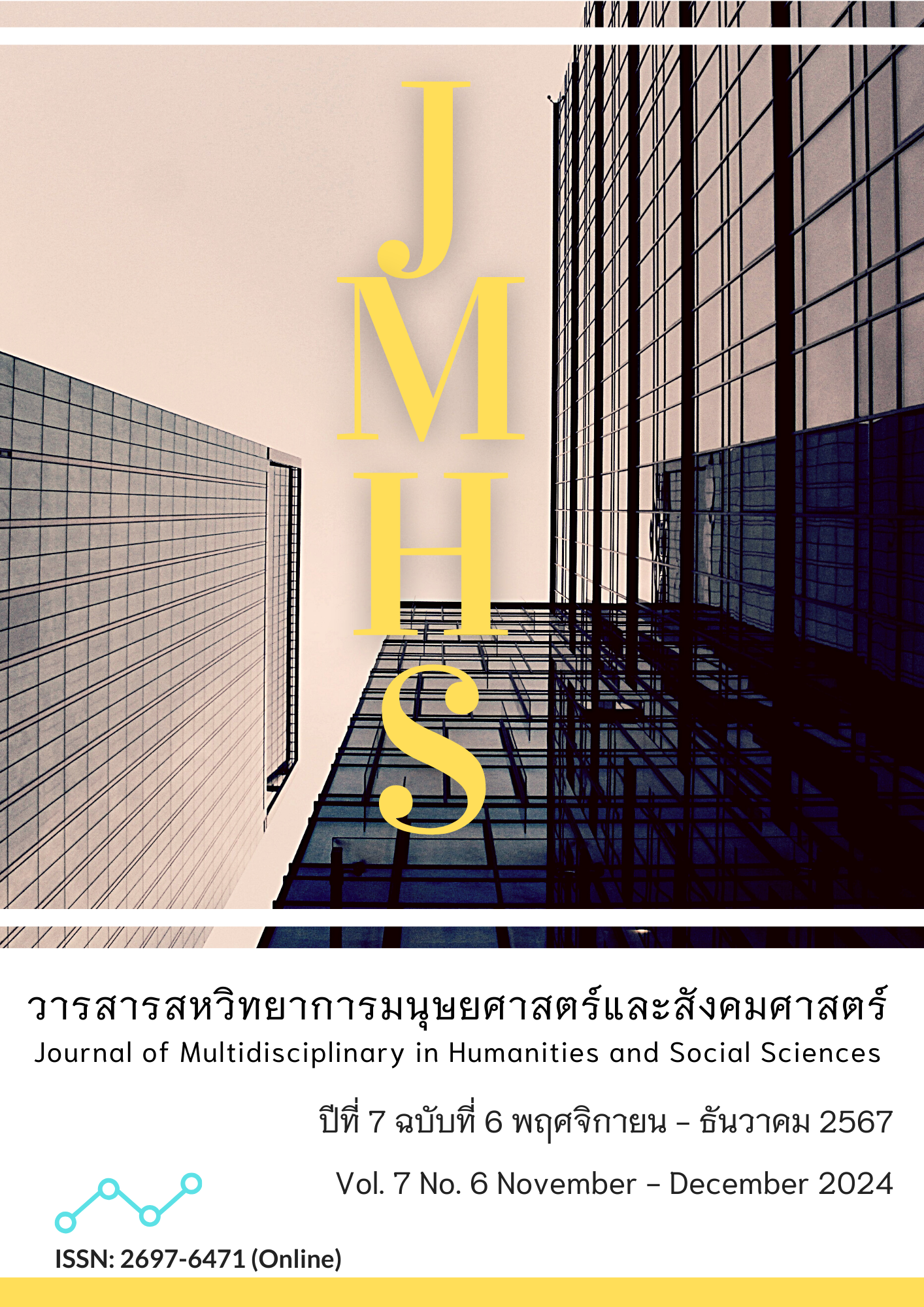Development of a Thai Language Learning Management Model Based on the Theory of Knowledge Creation in Combined with the Concept of Contemplative Education to Promote the Concept and Ability to Connect Thai Language Core Knowledge of Graduate Students
Main Article Content
Abstract
This article had the objectives: 1) to develop a learning management model for Thai language principles according to the theory of knowledge creation combined with the concept of contemplative education and 2) to study the effectiveness of the learning management model for Thai language principles according to the theory of knowledge creation combined with the concept of contemplative education. The research model was research and development using a mixed-methods research process based on a quasi-experimental research design with a single group pre-study and post-study measurement as the research framework. The research area was the Faculty of Education, Nakhon Phanom University. The sample group consisted of 58 Thai language students using the cluster random selection method. There were 8 types of tools used in the research: 1) document analysis form; 2) opinion questionnaire; 3) interview form; 4) learning management model; 5) learning management model use manual; 6) learning management plan; 7) test; and 8) opinion questionnaire. Data were analyzed using basic statistics in quantitative research cases. The qualitative research section was used to analyze the content. Then write a descriptive narrative.
The results of the research were as follows: 1) Thai language learning management model based on the theory of knowledge creation combined with the concept of contemplative education. There were 4 important elements: principles, objectives, learning management steps, and measurement and evaluation of learning management. 2) Results of the study of the effectiveness of the main Thai language learning management model according to the theory of knowledge creation combined with the concept of contemplative education the research found that 1) Results of comparing main concepts of the Thai language of students found that the main concepts of the Thai language have a significantly higher score after studying than before studying, at .05. 2) Results of comparing the ability to connect the main knowledge of the Thai language of students found that the ability to connect Thai language core knowledge was significantly higher after studying than before studying at .05. 3) The results of the study of students' opinions on the learning management model found that opinions of Thai language students regarding learning management The overall pattern is at a high level.
The findings from this research can be used to develop Thai language students to have quality knowledge and the ability to manage core learning. Thai language for learners in the 21st century is an innovation in research and development in Thai language learning formats at the higher education level.
Article Details

This work is licensed under a Creative Commons Attribution-NonCommercial-NoDerivatives 4.0 International License.
Views and opinions appearing in the Journal it is the responsibility of the author of the article, and does not constitute the view and responsibility of the editorial team.
References
กาญจนา คุณารักษ์. (2558). การออกแบบการเรียนการสอน. (พิมพ์ครั้งที่ 5). นครปฐม: มหาวิทยาลัยศิลปากร.
กาญจนา พลางวัน. (2565). สัมภาษณ์, 26 ธันวาคม.
จิรภัทร์ สิงห์คะ. (2565). สัมภาษณ์, 26 ธันวาคม.
จิรัฐกาล พงศ์ภคเธียร. (2553). การวิจัยและพัฒนาจิตตปัญญาศึกษาในสถาบันอุดมศึกษา. กรุงเทพฯ: จุฬาลงกรณ์มหาวิทยาลัย.
ชนาธิป พรกุล. (2554). การสอนกระบวนการคิด: ทฤษฎีและการนําไปใช้. กรุงเทพฯ: จุฬาลงกรณ์ มหาวิทยาลัย.
ฐนพรรณ ธูปหอม. (2565). สัมภาษณ์, 26 ธันวาคม.
ทิศนา แขมมณี. (2557). ศาสตร์การสอน: องค์ความรู้เพื่อการจัดกระบวนการเรียนรู้ที่มีประสิทธิภาพ.(พิมพ์ครั้งที่ 18). กรุงเทพฯ: จุฬาลงกรณ์มหาวิทยาลัย.
นันทิญา พันธ์โชค. (2565). สัมภาษณ์, 27 ธันวาคม.
พัฒนพงษ์ เทพสันทัด. (2565). สัมภาษณ์, 26 ธันวาคม.
พิมพันธ์ เดชะคุปต์ และ พเยาว์ ยินดีสุข. (2558). การจัดการเรียนรู้ในศตวรรษที่ 21. (พิมพ์ครั้งที่ 2). กรุงเทพฯ: จุฬาลงกรณ์มหาวิทยาลัย.
ภาคภูมิ ขุนชัย. (2565). สัมภาษณ์, 26 ธันวาคม.
วรรณี โสมประยูร. (2553). เทคนิคการสอนภาษาไทย. กรุงเทพฯ: ดอกหญ้าวิชาการ.
สมยศ คำนึงผล, จิรศักดิ์ สุรังคพิพรรธน์ และ ทนง ทองภูเบศร์. (2567). การส่งเสริมอัตลักษณ์ผู้เรียนด้วยการนิเทศการศึกษา. วารสารนวัตกรรมการจัดการศึกษาและการวิจัย, 6(1), 257-268. สืบค้นจาก https://so02.tci-thaijo.org/index.php/jemri/article/view/264757
สมศักดิ์ เอี่ยมคงศรี. (2561). การจัดการห้องเรียนในศตวรรษที่ 21. กรุงเทพฯ: ทริปเพิ้ล เอ็ดดูเคชั่น.
สมสิทธิ์ อัสดรนิธี. (2552). จิตปัญญาศึกษาคืออะไร. นครปฐม: มหาวิทยาลัยมหิดล.
สำนักงานราชบัณฑิตสภา. (2558). พจนานุกรมศัพท์ศึกษาศาสตร์ร่วมสมัย ฉบับราชบัณฑิตยสภา. กรุงเทพฯ: สำนักงานราชบัณฑิตยสภา.
สำนักงานเลขาธิการสภาการศึกษา. (2550). การจัดการเรียนรู้แบบสร้างองค์ความรู้. กรุงเทพฯ: ชุมนุมสหกรณ์การเกษตรแห่งประเทศไทย.
สิทธิพงษ์ พิมแสนศรี. (2565). สัมภาษณ์, 26 ธันวาคม.
สุทธิลักษณ์ สวรรยาวิสุทธิ์. (2565). สัมภาษณ์, 27 ธันวาคม.
อัจฉรา ชีวพันธ์. (2553). พัฒนาทักษะภาษาพัฒนาความคิดด้วยกิจกรรมการเล่นประกอบการสอนภาษาไทย. กรุงเทพฯ: จุฬาลงกรณ์มหาวิทยาลัย.
Chanmanee, S. (2024). Pre-service English teachers’ perceptions toward effective English teachers: A study of English student teachers in a Faculty of Education at a Thai University. Journal of Multidisciplinary in Humanities and Social Sciences, 7(1), 81–99. Retrieved from https://so04.tci-thaijo.org/index.php/jmhs1_s/article/view/267849
Hardy, M. D. (1997). Von Glaserfeld’s radical constructivism: A critical review. Science & Education, 6, 135–150. https://doi.org/10.1023/A:1008664626705
Jahnke, J. C., & Nowaczyk, R. H. (1998). Cognition. New Jersey: Prentice-Hall.
Joyce, B., Weil, M., & Calhoun, E. (2009). Models of teaching. (8th ed). New York: Allyn & Bacon.
Krulik, S., & Rudnick, J. A. (1993). Reasoning and problem–solving: A handbook for elementary school teachers. Boston: Allyn& Bacon.
Llewellyn, D. (2013). Teaching High School Science Through Inquiry and Argumentation. (2nd ed). California: Corwin.
Piaget, J. (1960). The Moral Judgment of the Child. Illinois: The Free Press.
Smith, P. L., & Ragan, T. J. (2005). Instructional Design. (3rd ed.). New Jersey: John Wiley & Sons.


